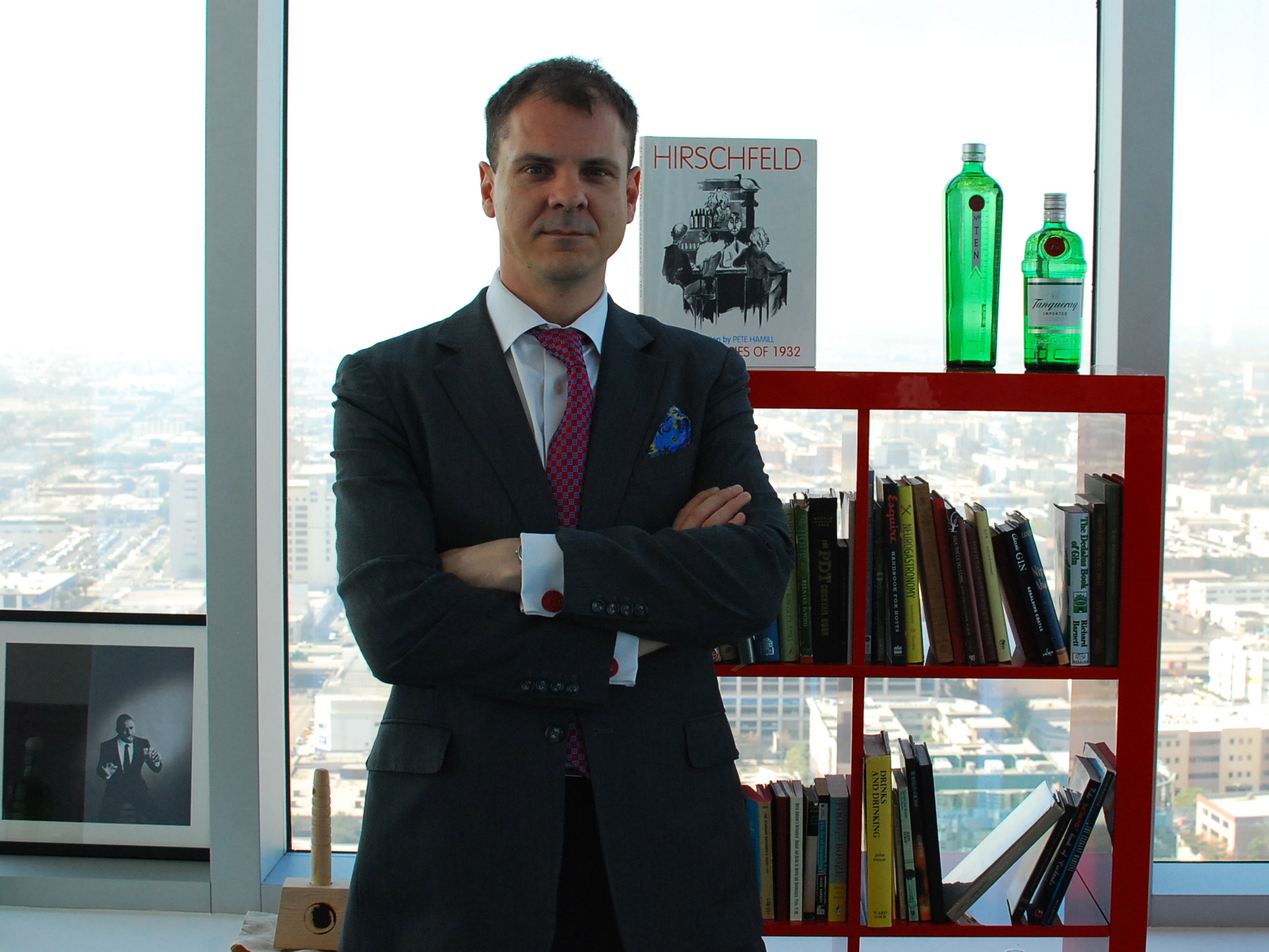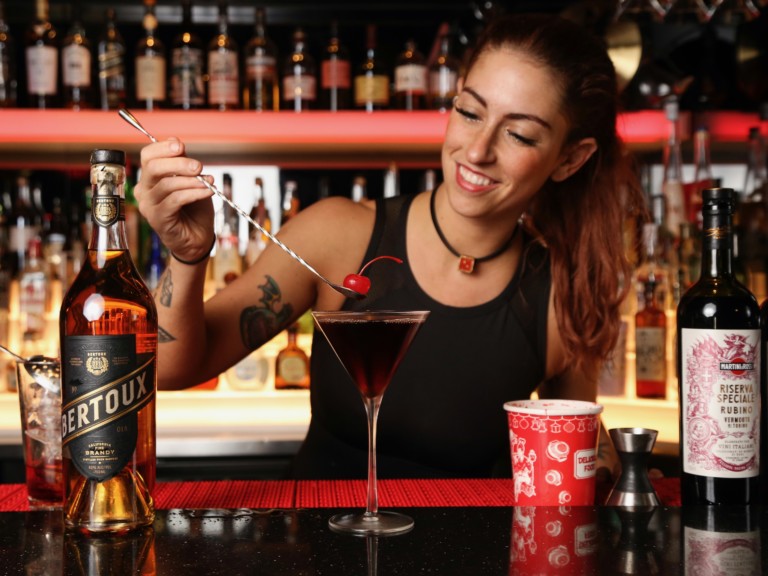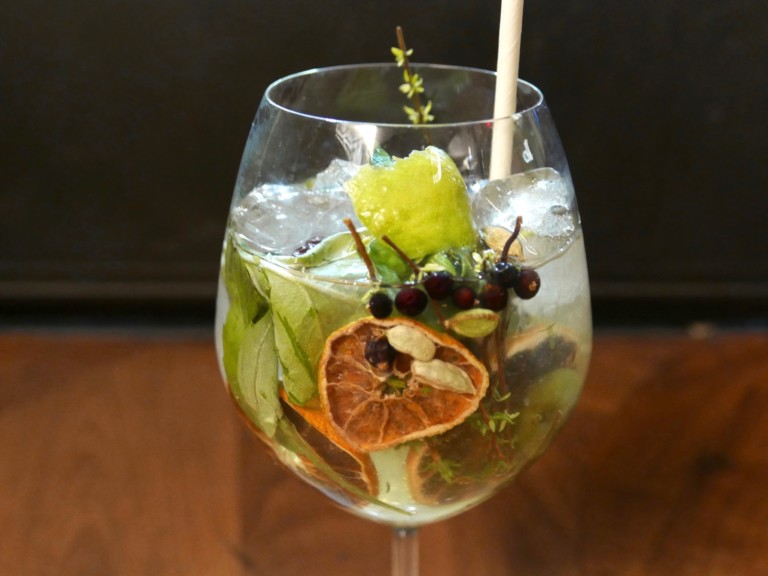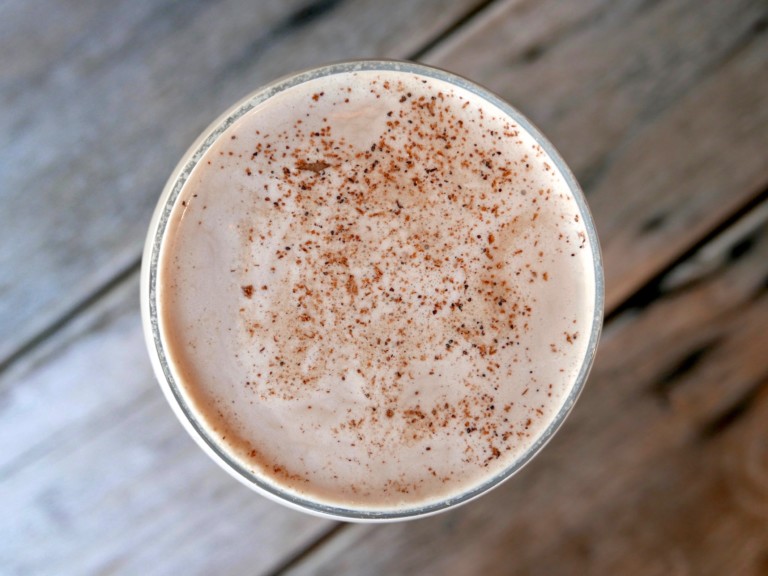INTERVIEW CONTINUED FROM PREVIOUS PAGE
If you could spend the night behind the bar, anywhere, for a guest shift, where would that be?
Interesting. You could say one of the grand hotel bars. It would be great to do a shift in the American Bar in Savoy, the King Cole Bar in the St. Regis Hotel. It would be an honor to work behind the bar at High Five in Tokyo, just because I massively respect the people who go there, and the person that runs it. Other than that, I would take a shift anywhere and be happy with it. I remember working, doing a tour like 10 years ago, where I would go to places like Detroit and Cleveland. I would walk in with my lemons and my mint and my sugar syrup and they’d be like, “Yeah, we don’t do that fancy stuff here.” Two hours later, when I was leaving, the bartenders and staff were like, “My god, that was incredible. Would you like to come back and do this again? We’d love to have you.” I’ll work anywhere they want.
Do you think that translated to the bar after you left?
A little bit. When I say part of the time as brand ambassadors and mixologists – whatever you want to call them – will come along and want to do really complicated cocktails. I prefer to do drinks that everyone can do long after I’m gone. On this tour, for example, I’ve really been pushing the White Lady, telling bartenders, “It’s a gin margarita.” Gin, Cointreau, lemon juice. It’s a fantastic drink. It’s a cross-sell. It’s not an up-sell, which we all obsess about. Ir’s a cross-sell. It’s different from what you order, and not necessarily more expensive. These are drinks that have a chance of being made again and again. A gin sour with half a dozen basil leaves is easy enough to understand, instead of something that uses six drops of bitters and you have to dry-shake the egg whites. I’m a big believer that a lot of cocktails now are too complicated. They’re too complicated in terms of too many ingredients, too many contrasting flavors, trying to be bigger and bolder, competing with chefs. We can’t compete with chefs because their food is not mashed up. If all chefs made soups, that would be something we could compare to. When your food is laid out differently, you can work with flavors and counterpoints of flavors. Cocktails all being in one go means high quality ingredients, simplicity, ease of preparation – so they can make them consistently, time and time again – is far more important than, “Look at me and how clever I am. I’m using shiso and kumquat bitters and four different amaros that no other bar in the world has.”
Do you develop new cocktails in your duties too?
Not too much. Part of this tour, we run a session called Bartender Voodoo. The idea is that, especially with gin, we have a huge repertoire of great cocktails that have fallen off the radar, yet the Aviation, the Monkey Gland, the Clover Club, the Last Word, the Pegu Club, these are some of the coolest drinks you can order in bars now. We just encourage people to go through my library, pick an old cocktail book, find a gin recipe they’ve never seen before, and remake it. I see myself as more of a high priest of bartender voodoo, in terms of resurrecting old cocktails, rather than creating new ones. I’ve been bartender 24 years. In that time period, there have only been maybe 10 cocktails created that will become classic cocktails in the future. Yet, we live in the most knowledgeable and creative bartending set and culture that’s ever existed. Still, most of their cocktails are okay, but not so good that they transcend to that next level of global classicism.
What are the common threads that you see in a classic?
What we tend to say, again, is simplicity of ingredients. Something like a bramble, gin, lemon, sugar, blackberry liqueur. Penicillin, which is basically a whiskey sour, but with a honey ginger syrup and a float of a smoky single-malt. These are ingredients that every bar has. They have to be simple enough where everyone can do it and not screw it up. The ingredients have to be ubiquitous. It also has to be something that’s different or unique. It can be a flavor pairing, or a process in making it, but if I knew the secret to modern classic cocktails, I would be a very rich man. I’m quite good at seeing them and spotting them. Part of my job is just modeling the behavior I see, rather than necessarily saying, “Be like me.” I’ve watched 50 of the top bartenders in each discipline and these are the common threads that I see about them. When I teach people about making cocktails, it’s very easy. It’s a balance of strong and weak, sweet and sour, now go out and play with the ingredients you have, rather than saying, yes, it’s about passion fruit with cilantro, or the subtle vanilla notes in this bourbon, because some of them get this and some of them don’t. There’s a rum punch, 1 of sweet, 2 of sour, 3 of strong, 5 drops of nutmeg, 5 drops of bitters with nutmeg spice, well chilled, lots of ice. That’s a recipe for cocktail success straight away.
What’s the biggest challenge in traveling the world constantly and never stopping?
I can’t remember the last time I shopped in a grocery store, cooked my own food, or washed my own clothes. That’s not necessarily a good thing. I like ironing my own shirts. It’s sometimes difficult. You wake up and can’t remember entirely what city you’re in.
Going to cities you’ve never been before, you’re not sure of the skill levels, so you’re not sure if you’re pitching it way above them or way beneath them. Both of those are useless. You waste my time and your time if I’m saying stuff you already know, but you’re too polite to tell me, or I’m saying stuff you have no idea what I’m talking about, but you’re too embarrassed to admit. So it’s about finding out some research beforehand.
I miss friends and family. I don’t miss London so much, but that’s where I was based.
I spend time in cities, but I don’t see much of the city. I went to Moscow six times before I ever managed to see Saint Basil’s Cathedral and Red Square, often going past them in cabs from one bar to the next.
I spend a lot of time sitting in airports, staring at the late notices on information boards, which is annoying. I always have things to catch up with.
Like anybody, there’s good and bad. Would I swap it? I have a fantastic life, lucky. I spent my time in the trenches. Don’t get me wrong. I’ve cleaned up more vomit, thrown out more drunk customers, taken more abuse, than many people should get, but at the same time, being in the service industry has a degree of nobility about it, to want to make people’s lives better. Also, it’s an easy job to do badly, a very difficult job to do well. It’s when you get simple acknowledgement from people, be it a civilian, or this year, I was honored enough to be given International Brand Ambassador of the Year. You look at the group of judges and I say, “I respect these people.” They tip their hat to me and say, “Job well done.” And that makes everything good.
If you could fill your glass with only one more cocktail, what would be in it?
Interesting. It’s funny. As bartenders, as we often do – because there’s a lot of hanging around – we have those conversations about, “What would be your fantasy speed rail in your bar?” Or the bottle you would take away on a desert island. Things like that. Tanqueray 10 would be my desert island gin, and a great gin martini would probably be something I would be more than happy to go out with a dry martini clasped in my hand.
In terms of the spirits I would happy to be stuck on a desert island with, it changes every couple years, but for now, it’s a Grappa. It’s a 20-year-old Barolo Grappa made by my company called Marolo, which is honestly like kissing a unicorn. If god invented anything better than that, he kept it for himself. I think every single day you could drink that and it would have complexity. If I could see the asteroid coming for the earth now, it would be a large, well-made dry martini. Not large in terms of the glass, but large in terms of my glass and then a carafe or a martini pitcher, or some of the sort of stuff you see around here, so that I could just sip and savor what would be a spectacular moment.
Who would you let make it for you if you could not make it yourself?
Interesting. I would have thought maybe Salvatore “The Maestro” Calabrese, only because I would tell him how I wanted it made, and that would annoy him intensely. At the same time, we’re friends. Peter Dorelli, ex head bartender of the American Bar at the Savoy would be pretty good. I would take Steve Olson. Even though he’s not really a bartender anymore, he would be good to go down with. Dick Bradsell. There are people all over the world. That’s why if I could see the asteroid and I could be anywhere on the planet, I could still find a friend to make me a good drink.









Leave a Comment